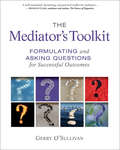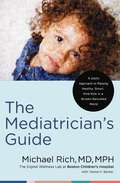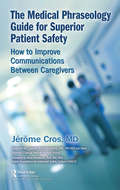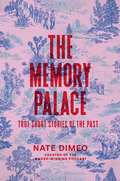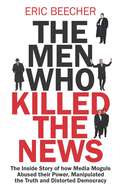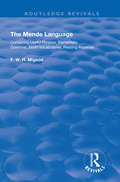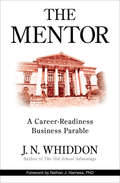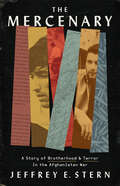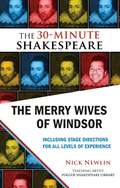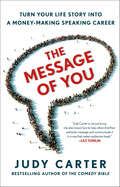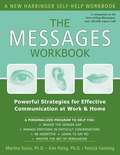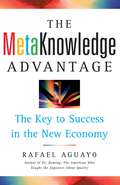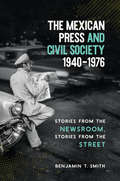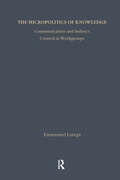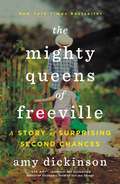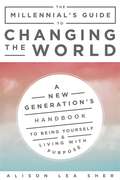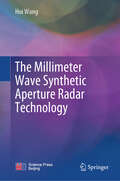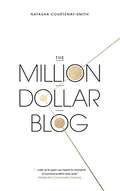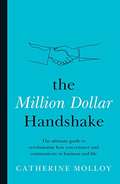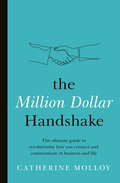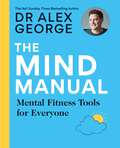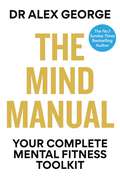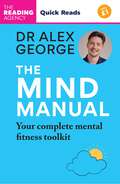- Table View
- List View
The Mediator's Toolkit: Formulating and Asking Questions for Successful Outcomes
by Gerry O'Sullivan“Dives deep into the psychology of information and emotion in conflict situations . . . Highly recommended for facilitators and negotiators as well as mediators.” —Jennifer Beer, author of The Mediator’s Handbook and negotiation instructor at Wharton School, University of PennsylvaniaKnowing how to formulate and ask incisive questions to get to the core of a conflict, challenge entrenched thinking, and shift perspectives is the key to successful conflict resolution. The Mediator’s Toolkit employs the author’s powerful “S Questions Model” to provide readers with the skills and tools to do just that. It addresses four dimensions of successful questions for mediation: the subject matter dimension, the structure dimension, the information-seeking dimension, and the shifting thinking dimension. The toolkit clearly explains:The theory behind each question type, including exploration of relevant neuroscience and psychologyThe purpose of different types of questionsHow the questions workWhen to use different types of questionsHow to build and apply questions to mediation in a non-threatening wayThis essential practical guide will radically sharpen, focus, and improve the questioning skills of qualified mediators, students, lecturers, trainers, and those using questions to challenge and effect change, in any context.
The Mediatrician's Guide: A Joyful Approach to Raising Healthy, Smart, Kind Kids in a Screen-Saturated World
by Michael Rich, MD, MPHGain the confidence you need to raise a child well in the digital age.In this positive, science-based approach, Dr. Michael Rich addresses your questions and concerns about your childrens&’ screen time and media use. The Mediatrician&’s Guide empowers you to guide your family toward smart and healthy digital choices.Known as the &“Mediatrician&” due to his acclaimed work as a pediatrician, child health researcher, and children&’s media specialist, Dr. Rich presents a compassionate and encouraging look at the reality of growing up in a screen-saturated world. You won&’t find fearmongering here—just accessible explanations, case studies, and practical tips to help your kids thrive in a technology-rich environment and emerge as happy, well-informed, empathetic adults.Features include:Ask the Mediatrician: Questions and answers based on Dr. Rich&’s long-running advice column and podcastMedia Rx: Prescriptive content based on insights from the Digital Wellness Lab and the Clinic for Interactive Media and Internet DisordersYou Can: Straightforward instructions for what you can do to guide your child in the digital landscapeDigital Wellness Primer: A one-stop resource for actionable advice that you can customize for your family&’s specific needsBacked by evidence as well as decades of professional and personal practice, The Mediatrican's Guide will give you peace of mind and your kids much-needed tools to navigate the digital environment in a way that reduces the risks to their physical and mental health and their emotional and social development..&“A caring, wise, and joyful guide to the possibilities and the perils of our increasingly more digital existence.&”—Marlo Thomas, activist, actor, and author&“This book is a must-have and will soon become your best friend, full of daily tips and long-lasting wisdom.&”—Sanjay Gupta, MD,associate professor of neurosurgery, Emory, and chief medical correspondent, CNN
The Medical Phraseology Guide for Superior Patient Safety: How to Improve Communications Between Caregivers
by Jerome CrosIn patient care, inaccuracy often leads to error: the patient does not receive the right medication, the nurse is mistaken about the patient, the doctor is mistaken about the condition. Human error in care is now a well-known occurrence, and medicine has borrowed many tools from aviation to improve safety, such as simulation training, limitation of working time, use of checklists, and so forth. All these tools contribute to improving human factors in healthcare. Often due to the lack of communication between professionals, healthcare accidents are avoidable. The only solution is the standardization of communication through phraseology. But make no mistake, the subject of communication is vast and much more complex to teach than we imagine. Communication is not only an exchange of words, of meaning, of a sender-receiver scheme; it also carries the essence of all social and cooperative life by its tone, by its moment, by the listening and availability it demands from the other person, by the words chosen, by those not said voluntarily, and those referred to as “tacit” (what we no longer need to say but the other guesses). The Medical Phraseology Guide for Superior Patient Safety: How to Improve Communications Between Caregivers, through concrete and proven examples, gives readers the keys to improve communication with their healthcare colleagues. The author proposes 26 rules that are detailed and easy applicable in everyday life. These rules are inspired by the tools and checklist developed and used by commercial airline pilots. Today, more than ever, caregivers face new situations, and they have to adapt to caring for an unusual number of patients, sometimes in new environments. Given this new environment, it becomes clear that teamwork and communication are indispensable tools for improving efficiency and safety in patient care.
The Memory Palace: True Short Stories of the Past
by Nate DiMeoIncredible true stories reveal strange new magic in American history in this wondrous first book from the creator of the award-winning podcast The Memory Palace.&“One doesn&’t often find the words imagination and history in the same sentence. Nate DiMeo has forever woven them together. The Memory Palace wants you to linger, to stay awhile, and find a deeper meaning both in the stories of the past and perhaps in your own life as well.&”—Ken BurnsThe Memory Palace is a collection of crystalline historical tales that read like luminous short fiction and, like Nate DiMeo&’s acclaimed podcast of the same name, conjure lost moments and forgotten figures who are calling out across time to be remembered.Space capsules filled with fruit flies and future senators. A socialite scientist who gives up her glamorous life to follow love and the elusive prairie chicken. A boy genius on a path to change the world who gets lost in the theoretical possibilities of streetcar transfers. An enslaved man who steals a boat and charts a course that leads him to freedom, war, and Congress. A farmer&’s wife who puts down her butter churn, picks up the butter, and becomes an international art star. An amusement park glowing at the water&’s edge when electric lights are a brand-new thing. This cabinet of curiosities teems with wonder.For fifteen years, Nate DiMeo has turned to the past to make sense of the way we live today, finding beauty and meaning in history&’s dustier corners, holding things up to the light and weaving facts, keen insight, wit, and poignant observation into unforgettable tales. With new stories and treasured favorites from the beloved podcast assembled alongside dynamic illustrations and archival photographs for the first time, enchantment awaits you.
The Men Who Killed the News: The inside story of how media moguls abused their power, manipulated the truth and distorted democracy
by Eric BeecherCrikey owner and ex-News Corp and Fairfax editor lifts the lid on the abuse of power by media moguls – from William Randolph Hearst to Elon Musk – and on his own unique experience of working for (and being sued by) the Murdochs. What&’s gone wrong with our media? The answer: its owners. From William Randolph Hearst to Elon Musk, from the British press barons to colonial upstarts Conrad Black and Rupert Murdoch, media proprietors have manipulated the news to accumulate wealth and influence as they meddled with democracy. Eric Beecher knows the news business from bottom to top. He has been a journalist, editor and media proprietor (of Text Media and Crikey), with the rare distinction of having both worked for and been sued (unsuccessfully) by the Murdochs. This book reveals the distorted role of the media moguls of the past two centuries: their techniques, strategies, behind-closed-doors machinations, and indulgent lifestyles. It explains how they have exploited the shield of the freedom of the press to undermine journalism – and truth. In an era of fake news, AI and misinformation, this is democracy&’s chillingly important story: how a small coterie of flawed and narcissistic moguls created a shadow of power that has contributed to making the media an agent of mistrust.
The Mende Language: Containing Useful Phrases, Elementary Grammar, Short Vocabularies, Reading Materials (Routledge Revivals)
by F.W.H. MigeodFirst published in 1908, this volume emerged in the midst of the British Protectorate of Sierra Leone. The author, F.W.H. Migeod, studied the Mende nation in eastern Sierra Leone and followed the example of the grammar (1882) and vocabulary (1884) published by Dr. Schoen in using the southern form of the Mende language. Beginning with an introduction to the recent history, culture and characteristics of the Mende nation and Sierra Leone, this volume covers useful phrases, grammar, vocabulary and example reading materials including stories and songs collected from native speakers.
The Mentor: A Career-Readiness Business Parable
by J.N. WhiddonA student discovers the 12 Keys for Professional Success in this modern business parable by the acclaimed author and entrepreneur.The semester has begun, and Professor Johnathan Daniels welcomes his next batch of students into his classroom. He teaches the capstone Business Communications course at State U, one of the most valuable classes a student can take. As senior Aaron Woods takes his seat, he has no idea the wealth of knowledge, skills, and communication tools he’s about to receive that will help him conquer life after graduation.Dr. Daniels’ curriculum consists of his “12 Keys to Professional Success,” which offer help and guidance through any career-related obstacle one might encounter. As Aaron and his class make their way through the 12 Keys, they’ll gain wisdom and learn how to master essential principles—such as establishing rapport with others, time management, interview skills, dressing professionally, and more.Grab a seat: class is about to begin.
The Mercenary: A Story of Brotherhood and Terror in the Afghanistan War
by Jeffrey E SternA thrilling and emotional story about the bonds forged in war and good intentions gone wrong. In the early days of the Afghanistan war, Jeff Stern was scouring the streets of Kabul for a big story. He was accompanied by a driver, Aimal, who had ambitions of his own: to get rich off the sudden infusion of foreign attention and cash. In this gripping adventure story, Stern writes of how he and Aimal navigated an environment full of guns and danger and opportunity, and how they forged a deep bond. Then Stern got a call that changed everything. He discovered that Aimal had become an arms dealer, and was ultimately forced to flee the country to protect his family from his increasingly dangerous business partners. Tragic, powerful, and layered, The Mercenary is more than a wartime drama. It is a Rashomon-like story about how politics and violence warp our humanity, and keep the most important truths hidden.
The Merry Wives of Windsor: The 30-Minute Shakespeare
by Nick NewlinPlanning a school or amateur Shakespeare production? The best way to experience the plays is to perform them, but getting started can be a challenge: The complete plays are too long and complex, while scene selections or simplified language are too limited."The 30-Minute Shakespeare" is a new series of abridgements that tell the "story" of each play from start to finish while keeping the beauty of Shakespeare's language intact. Specific stage directions and character suggestions give even inexperienced actors the tools to perform Shakespeare with confidence, understanding, and fun!This cutting of THE MERRY WIVES OF WINDSOR begins with one of Shakespeare's favorite fat knights, Sir John Falstaff, announcing his intention to woo both Mistress Ford and Mistress Page simultaneously, to the delight of his cohorts Bardolph, Pistol, and Nym, who then decide to double-cross Falstaff. The characters' movements on stage are clearly denoted so that even inexperienced actors can give the scenes life: Robin is nearsighted, Bardolph is a drunk who tries to juggle, and Pistol and Nym are constantly jostling for position. Other key moments include the hilarious wooing of Mistress Ford by Falstaff and the hysterical concealment of Falstaff in the laundry basket. The cutting ends in the woods with Falstaff dressed as a stag, being tormented by fairies for his comeuppance.The edition also includes an essay by editor Nick Newlin on how to produce a Shakespeare play with novice actors, and notes about the original production of this abridgement at the Folger Shakespeare Library's annual Student Shakespeare Festival.
The Message of You: Turn Your Life Story into a Money-Making Speaking Career
by Judy CarterA step-by-step handbook that teaches readers to find the extraordinary stories tucked deep within them to make a difference in the lives of others—and to get paid—as a motivational speakerTHE MESSAGE OF YOU begins with a simple belief - that your greatest speech already exists and that it has already been delivered in front of a live audience masterfully and powerfully by you. Best-selling author and international comic, Judy Carter sets out to prove that THE MESSAGE OF YOU is in the advice you give to your friends; in the lessons you teach your children; in the stories you tell your family. It's expressed through the volunteer work you do, the way you run your business, the way you turned your messes into successes. THE MESSAGE OF YOU is a distillation of all of your experiences, both personal and professional, that form the narrative meaning of your life. A meaning that you can develop into a well-written, funny speech to inspire audiences, enhance your current profession, and launch a successful money making career as a professional speaker. In Part One of the book, Judy leads you through a series of in-depth exercises meant to mine your personal and professional experiences for stories that establish your qualifications, your problem/solutions, your action steps and your methodology. In Part Two, Judy has created a six-step structure for writing an entertaining and informative speech, guiding you through each step in detail. But the real bonus of THE MESSAGE OF YOU is that Judy is a comic. Her "Comedy Pass" chapter takes you through simple but effective comedy writing techniques that will transform even a flat PowerPoint snoozer into a knee-slapping showstopper of a keynote. Once your speech is well-written and funny, Judy takes you through Part Three, teaching you how to take your message to the masses with inexpensive but essential marketing tips. The Message of You offers an accessible approach, big picture guidance, and nitty-gritty nuts and bolts of sound advice. Judy has been a comedy and speaking coach for over twenty years. She's a firm believer that how you present your ideas is just as important as the ideas themselves. She knows that humor and strong content are the missing ingredients in most speeches and her book, THE MESSAGE OF YOU helps you discover both your message and your comedic voice by taking you through the same process she uses to coach her private clients.
The Messages Workbook: Powerful Strategies For Effective Communication At Work And Home
by Patrick Fanning Martha Davis Kim PalegSimply put, skill at communicating with others is the single largest determinant of anyone's happiness, and success. Rewarding and lucrative careers, strong and lasting friendships, meaningful and satisfying romance all hang on this one uniquely human ability. You need strong communication skills to survive. The better able you are to communicate with others, the happier and more successful you will be.
The Metaknowledge Advantage
by Rafael AguayoIn the tradition of the bestselling Intellectual Capital, internationally recognized management and quality expert Rafael Aguayo shows how integrated mastery of many areas of knowledge -- MetaKnowledge -- can give corporate managers an edge, no matter what the future has in store. In today's world, the basis of economic power and wealth is rapidly shifting from physical resources to intellectual resources. Former powerhouses like U.S. Steel are now minor players, while modern giants such as Microsoft dominate industries that didn't even exist twenty-five years ago. The economy undergoes wild fluctuations. The Internet boom has come and gone. Through globalization, international boundaries are becoming less important every day. In such a dramatically changing environment, the management philosophy that endures must be based on principles that transcend daily occurrences and swings in the market. That's where MetaKnowledge comes in. Rafael Aguayo brings years of firsthand consulting experience to this book and galvanizes it with an impressive yet accessible body of academic study. A disciple of W. Edwards Deming, Aguayo studied with the man who brought quality to the Japanese. He has since expanded his field of expertise to encompass many subjects that contribute to successful business strategies, no matter what the industry. In The MetaKnowledge Advantage, Aguayo gives American managers an advantage by helping them break out of their narrow fields of expertise, synthesizing areas of knowledge as diverse as ecology, psychology, statistics, chaos theory, self-actualization, and the theory of multiple intelligences. Drawing on the work of Walter Shewhart (the father of Statistical Quality Control), W. Edwards Deming, Carl Jung, James Lovelock, Bertrand Russell, and many other luminaries, The MetaKnowledge Advantage offers a comprehensive -- and extremely flexible -- strategy for good management and ethical behavior in any industry.
The Mexican Press and Civil Society, 1940–1976: Stories from the Newsroom, Stories from the Street
by Benjamin T. SmithMexico today is one of the most dangerous places in the world to report the news, and Mexicans have taken to the street to defend freedom of expression. As Benjamin T. Smith demonstrates in this history of the press and civil society, the cycle of violent repression and protest over journalism is nothing new. He traces it back to the growth in newspaper production and reading publics between 1940 and 1976, when a national thirst for tabloids, crime sheets, and magazines reached far beyond the middle class.As Mexicans began to view local and national events through the prism of journalism, everyday politics changed radically. Even while lauding the liberty of the press, the state developed an arsenal of methods to control what was printed, including sophisticated spin and misdirection techniques, covert financial payments, and campaigns of threats, imprisonment, beatings, and even murder. The press was also pressured by media monopolists tacking between government demands and public expectations to maximize profits, and by coalitions of ordinary citizens demanding that local newspapers publicize stories of corruption, incompetence, and state violence. Since the Cold War, both in Mexico City and in the provinces, a robust radical journalism has posed challenges to government forces.
The Micropolitics of Knowledge: Communication and Indirect Control in Workgroups (Communication & Social Order)
by Emmanuel LazegaFor many years Emmanuel Lazega has explored communication behavior and decision-making processes of small workgroups within larger organizations. To account for the knowledge claims of members of those groups, and for the ways in which such claims are legitimated collectively and translated into action, he presents a theory of the interactive elaboration of information on which decisions are based.
The Mighty Queens of Freeville: A Mother, a Daughter, and the Town That Raised Them
by Amy DickinsonDear Amy,First my husband told me he didn't love me. Then he said he didn't think he had ever really loved me. Then he left me with a baby to raise by myself. Amy, I don't want to be a single mother.I told myself I'd never be divorced. And now here I am--exactly where I didn't want to be!My daughter and I live in London. We don't really have any friends here. What should we do?Desperate Dear Desperate,I have an idea.Take your baby, get on a plane, and move back to your dinky hometown in upstate New York--the place you couldn't wait to leave when you were young. Live with your sister in the back bedroom of her tiny bungalow. Cry for five weeks. Nestle in with your quirky family of hometown women--many of them single, like you. Drink lots of coffee and ask them what to do. Do your best to listen to their advice but don't necessarily follow it.Start to work in Washington, DC. Start to date. Make friends. Fail up. Develop a career as a job doula. Teach nursery school and Sunday School.Watch your daughter grow. When she's a teenager, just when you're both getting comfortable, uproot her and move to Chicago to take a job writing a nationally syndicated advice column.Do your best to replace a legend. Date some more.Love fiercely. Laugh with abandon. Grab your second chance--and your third, and your fourth.Send your daughter to college. Cry for five more weeks.Move back again to your dinky hometown and the women who helped raise you.Find love, finally.And take care.Amy
The Millennial's Guide to Changing the World: A New Generation's Handbook to Being Yourself and Living with Purpose
by Alison Lea SherA guide and blueprint to a purposeful millennial existence—and how we can make a difference. What does it mean to be a millennial in this chaotic world? Beyond Snapchat and Tinder, the consumerist culture we’ve inherited, and quarter-life crises, can a millennial aspire to more? Alison Lea Sher argues, yes, we can! Packing herself up in an RV, Sher embarks on a road trip in hopes of starting a conversation about what it means to grow up in America, post-Great Recession. Interviewing 150 of her millennial peers as they begin their adult lives—from kids heading straight to Wall Street after college to those sleeping on it—Sher asks: “Who are you; what should you do; and how can you step into your destiny as a stakeholder in society?” The Millennial’s Guide to Changing the World is a one-of-a-kind ethnographic study on the spotlighted millennial generation, as told by millennials—the largest generation in US history that is now transitioning from adolescence to adulthood. As millennials embark on a young adult quest during a frightening time, how can they enlist the idealism, values, and resistance politics they are so well-known for to discover a sense of self and purpose? Learn how to: “Adult”—and not in the way society defines itRide the technology revolution, instead of letting it ride youBe ethical, inclusive, and sex-positive in your relationshipsResist the corporate oligarchy we live inRecognize privilege, embrace diversity, and fight for equalitySave the earth, literally With intimate stories, ethnographic research, and practical tips, The Millennial’s Guide to Changing the World will inspire every young person, showing them how to optimize their coming-of-age potential in a world that desperately needs it.
The Millimeter Wave Synthetic Aperture Radar Technology
by Hui WangThis book highlights the basic theories and technical principles of the synthetic aperture radar (SAR), aiming to bridge theories and applications for readers. Supported by the practical experience of the author's dedicated research, this book also constructs the SAR theoretical system from multiple perspectives.The synthetic aperture radar (SAR) is a weather-independent microwave remote sensing device that involves a number of multidisciplinary fields such as signal processing and image information processing. Written by experts in remote sensing and signal processing, the book explains the signal echo modeling, imaging principles and algorithms, image quality control methods, and image applications. Readers are provided with concise descriptions of commonly used imaging algorithms for SAR in multiple regimes, modes, and applications, including the Range Doppler Algorithm (RDA) and the Frequency Scaling Algorithm (FSA). Continuous wave/pulse regime SAR technology, inverse synthetic aperture radar (ISAR) technology, digital beam forming (DBF), interferometry, and moving target detection methods are discussed in detail.The book is a must-read and comprehensive reference for researchers and engineers engaged in the R&D of the SAR and for graduate students interested in the field.
The Million Dollar Blog
by Natasha Courtenay-SmithIn a world where everyone wants to blog and blog posts are ubiquitous, how do you stand out? How do you blog your way from nobody to somebody?How do you make money blogging, how do you start your own blogging business, and how do you, as a business owner, use content to build your brand and drive your success? What do the world's most successful bloggers know that you don't know (yet)? No matter who are you - a mum at home, a budding fashion blogger, a lifestyle blogger, a food blogger, a big business owner or a small business owner - The Million Dollar Blog is about blogging the smart way. It is the ultimate guide to:*Starting a successful blog*Blog writing*How to monetise your blog*How to develop a personal brand that grows your blog*How to blog for business*How to write*How take your existing blog to the next levelLearn to blog, learn to monetise your blog, discover how to build a successful blog for your business and hear the insider view from those in the blogosphere who are already making big incomes blogging. Plus, discover revenue streams beyond advertising and see how the income of million dollar bloggers is structured for maximum profit. Through a combination of practical advice and interviews with some of the world's most famous and successful bloggers, vloggers and content strategists, including Seth Godin, Lily Pebbles, Grant Cardone and Madeleine Shaw and dozens more, entrepreneur and digital strategist Natasha Courtenay Smith shows you how to build a blog that will increase your profile, create new opportunities, earn money and change your life. No wonder The Million Dollar Blog has been described by leading and award winning mummy blogger Vicky Psarias from Honest Mum as 'Brilliantly written, engaging and inspiring'.
The Million Dollar Handshake: The ultimate guide to revolutionise how you connect and communicate in business and life
by Catherine MolloyThe Million Dollar Handshake is about more than making money - it is also about helping you feel a million dollars.First impressions do count - and few have as much impact as your handshake. A handshake can let the other person know if we are nervous, over-excited, confident or interested in them, and it can tell us so much about that person too, once we learn the signs.A great handshake can lead to a positive outcome, help secure a deal and result in an ongoing relationship. We can make a good or bad impression within just seven seconds of meeting someone.This book shows you how to create a great first impression; offers advice on how to let the other person see that you are interested in them, that they can trust and depend on you; and delves into what you do and don't want your handshake to convey.The Million Dollar Handshake will teach you how to communicate better in all parts of your life, starting with those crucial first seven seconds. But the skills you'll learn won't stop there, because as you realise how your handshake reveals who you are, you'll be inspired to make the positive changes that will result in better first-time and ongoing communication with others.Includes access to exclusive online content featuring interactive training, worksheets an videos.
The Million Dollar Handshake: The ultimate guide to revolutionise how you connect in business and life
by Catherine MolloyThe Million Dollar Handshake is about more than making money - it is also about helping you feel a million dollars.First impressions do count - and few have as much impact as your handshake. A handshake can let the other person know if we are nervous, over-excited, confident or interested in them, and it can tell us so much about that person too, once we learn the signs.A great handshake can lead to a positive outcome, help secure a deal and result in an ongoing relationship. We can make a good or bad impression within just seven seconds of meeting someone.This book shows you how to create a great first impression; offers advice on how to let the other person see that you are interested in them, that they can trust and depend on you; and delves into what you do and don't want your handshake to convey.The Million Dollar Handshake will teach you how to communicate better in all parts of yourlife, starting with those crucial first seven seconds. But the skills you'll learn won't stopthere, because as you realise how your handshake reveals who you are, you'll be inspiredto make the positive changes that will result in better first-time and ongoing
The Mind Manual: Mental Fitness Tools for Everyone (Dr Alex George)
by Dr Alex GeorgeMental health matters! Learn how to assess your mental health today - and understand what's normal for you. Discover the seven universal truths that everyone should remember, and the mental fitness foundations that will boost you. And exercise your mind with the mental health toolkit that will help you thrive. Contents include -Part One: Your Mental Health Today-You are not alone-Know what feels normal for youPart Two: The Seven Universal Truths-Boundaries are beautiful-Mistakes are a must-havePart Three: Mental Fitness Foundations-It's good to talk-Why medical help mattersPart Four: Mental Health ToolkitResources
The Mind Manual: Mental Fitness Tools for Everyone (Dr Alex George)
by Dr Alex GeorgeMental health matters! Learn how to assess your mental health today - and understand what's normal for you. Discover the seven universal truths that everyone should remember, and the mental fitness foundations that will boost you. And exercise your mind with the mental health toolkit that will help you thrive. Contents include -Part One: Your Mental Health Today-You are not alone-Know what feels normal for youPart Two: The Seven Universal Truths-Boundaries are beautiful-Mistakes are a must-havePart Three: Mental Fitness Foundations-It's good to talk-Why medical help mattersPart Four: Mental Health ToolkitResources
The Mind Manual: Mental Fitness Tools for Everyone (Dr Alex George)
by Dr Alex GeorgeYour complete mental fitness toolkit by Dr Alex George'How are you? No really, how are you?'Learn how to assess your mental health today and understand what's normal for you.This is the mental health toolkit that will help you thrive.The Mind Manual is broken down into four parts with each one building on the last. Thegoal is to help you to establish your baseline, to know what peace feels like to you. Andthen to offer advice and tools to help you maintain that as much as possible.Part 1 looks at how to figure out where your baseline is and what normal feels like foryou. It's all about recognising your own needs so that you can best support yourselfwhen issues arise.Part 2 explores the seven universal truths and how they can support you when youmind is telling you lies. These seven truths are: Connection is your superpower; Sleepwill save you; Boundaries are beautiful; Mistakes are a must-have; Stress is the enemy;You are enough; Happiness is an inside job.Part 3 focuses on the foundations of mental fitness and explores the five different areasof life. These include what you eat and drink, how you release stress from your body,how much you move, how to talk out your thoughts and how to approach the medicalside of things.Part 4 is your mental health toolkit, where you'll find a wide range of worksheets andactivity tools to use. These can help while reading the book, but can also be usedregularly in your day-to-day life to check in on how you're coping.
The Mind Manual: Mental Fitness Tools for Everyone (Dr Alex George)
by Dr Alex GeorgeYour complete mental fitness toolkit by Dr Alex George'How are you? No really, how are you?'Learn how to assess your mental health today and understand what's normal for you.This is the mental health toolkit that will help you thrive.The Mind Manual is broken down into four parts with each one building on the last. Thegoal is to help you to establish your baseline, to know what peace feels like to you. Andthen to offer advice and tools to help you maintain that as much as possible.Part 1 looks at how to figure out where your baseline is and what normal feels like foryou. It's all about recognising your own needs so that you can best support yourselfwhen issues arise.Part 2 explores the seven universal truths and how they can support you when youmind is telling you lies. These seven truths are: Connection is your superpower; Sleepwill save you; Boundaries are beautiful; Mistakes are a must-have; Stress is the enemy;You are enough; Happiness is an inside job.Part 3 focuses on the foundations of mental fitness and explores the five different areasof life. These include what you eat and drink, how you release stress from your body,how much you move, how to talk out your thoughts and how to approach the medicalside of things.Part 4 is your mental health toolkit, where you'll find a wide range of worksheets andactivity tools to use. These can help while reading the book, but can also be usedregularly in your day-to-day life to check in on how you're coping.
The Mind Manual: Mental Fitness Tools for Everyone (Dr Alex George)
by Dr Alex GeorgeTHE SUNDAY TIMES BESTSELLER (December 2023)Mental health matters! Learn how to assess your mental health today - and understand what's normal for you. Discover the seven universal truths that everyone should remember, and the mental fitness foundations that will boost you. And exercise your mind with the mental health toolkit that will help you thrive.
